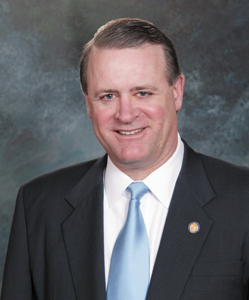STRAIGHT FROM THE SENATE

PART TWO: 15 FACTS CRITICS DIDN’T WANT YOU TO KNOW ABOUT NEW LAW REPAIRING UNEMPLOYMENT INSURANCE
STATEHOUSE – Despite critics’ claims that House Enrolled Act 1379 – legislation repairing Indiana’s bankrupt unemployment insurance fund – “doesn’t solve the problem,” conservative estimates anticipate the plan will structurally balance the fund by 2012. New on-going oversight will prevent future problems.
Gov. Mitch Daniels has repeatedly stated to Senate Republican leadership that the administration’s research revealed the unemployment insurance fix just passed will have no negative impact upon Indiana’s high national pro-business ranking. We are proud of the partnership forged with Gov. Daniels to achieve the supportive business environment our state enjoys today.
Senate leadership wanted you to know another side of the story on Indiana’s new unemployment insurance law. My last column began a list entitled “15 Things Critics Didn’t Want You To Know About Indiana’s New Law Making Unemployment Insurance Work.” Here is the conclusion.
7. Worker Misconduct Will Be Intolerable, Actionable: Employees fired and found guilty of poor attendance, working under the influence of alcohol or stealing from their employers will no longer be able to claim benefits, eliminating an estimated $20 million in waste each year.
8. Compliance Center Will Police $160 Million in Fraudulent Claims: A recent federal audit found that some workers were defrauding Indiana’s UI system at a rate of nearly five times the national average and further exacerbating the fund’s bleeding by up to $160 million each year. New cost-cutting reforms include the creation of a compliance center tasked with closely monitoring, preventing and stopping fraudulent claims.
9. Indiana Will Discard Deck Stacked Against Employers: Reforms to the claims adjudication process would give employers the best, fairest shake at the table in disputing errant unemployment claims by former employees. Historically, these decisions have been so skewed in workers’ favor, many employers – especially those already paying the highest premiums – found little point to dispute even the most fraudulent of claims. New training and review of administrative law judges will allow Indiana to discard the deck previously stacked against employers wanting to fight errant claims.
10. Plan Considers Recession, Slows Premium Schedule: Just as lawmakers recognized that a new tax on workers was indefensible given the national economic climate, they also recognized the need to slowly introduce any premium increases. Consequently, Senate Republicans kept in mind the recession employers are facing and spread the new rates over almost three years – saving businesses about $100 million in 2010 premiums. What’s more, there will be no premium increases in 2009.
11. Surcharges Were Avoided, Lower Wage Base Was Used: Senate Republicans fought for and were able to win key concessions for all of Indiana’s employers, including removing an additional $50-million 10-percent flat surcharge on all businesses in 2009 and lowering the taxable wage base from a House-proposed $10,000 to $9,500 – considerably lower than the national average of $14,418.
12. Unemployment Insurance Should, Will Work Like Other Insurance: Indiana’s Unemployment Insurance system is just that – an insurance system. Just as high-risk drivers pay higher premiums for their auto insurance than motorists who rarely have accidents, businesses with histories of large layoffs should – and now will – rightfully pay higher premiums than those that never lay off workers or make claims.
13. 45,000 Employers Will See Premium Decreases: Because Indiana’s unemployment insurance will be operated in the future like other insurance programs, close to 45,000 Hoosier employers who have never tapped the fund may actually see slight decreases in premiums.
14. New Reduced-Rate Option Raises Funds, Promotes Steady Jobs: Indiana’s just-passed bipartisan UI reform plan allows employers to take advantage of a first-ever buy-down option to lower their premiums. The plan gives employers a 2.5 for 1 bonus credit for every dollar they pay in to reduce their debit balance, potentially generating between $75 million to $100 million in new revenues to jump-start the fund’s solvency. It will also give employers paying top premiums due to high claims the motivation to avoid future layoffs and provide Hoosiers a more predictable job market.
15. Users’ and Abusers’ Premiums Stay Competitive in Midwest: Those who use the fund more – and consequently oppose some of our reforms – will see increases, but only to levels that will maintain Indiana’s economic competitiveness with other states. Even businesses that draw down Indiana’s UI fund balance the most by laying off the most workers will still pay lower premiums than the Midwest average. In neighboring states with bankrupt jobless funds, very few businesses – if any – will see similar competitive premium adjustments as businesses in Indiana will under the new plan. Already, many of these states have merely hiked up rates on businesses without initiating the sweeping reforms contained in Indiana’s plan.
Sen. David Long (R-Fort Wayne) is President Pro Tem of the Indiana Senate. He serves District 16, which includes portions of Fort Wayne.
- Celebrating 20 Years Of Community At The Stand - April 12, 2024
- First Positive Case Of Chronic Wasting Disease In Indiana - April 12, 2024
- Southwest Allen County Schools Embark On Major Tree Plantings - April 12, 2024


